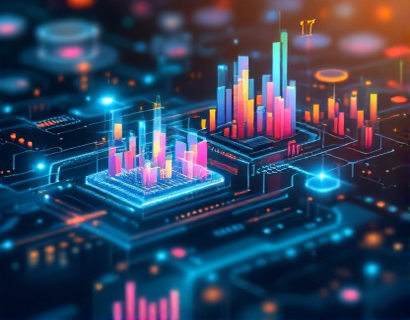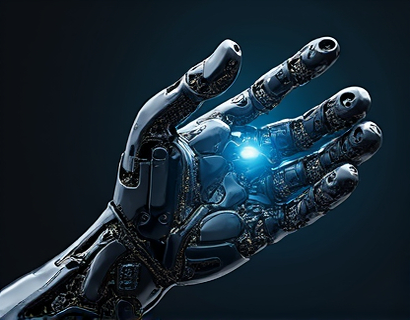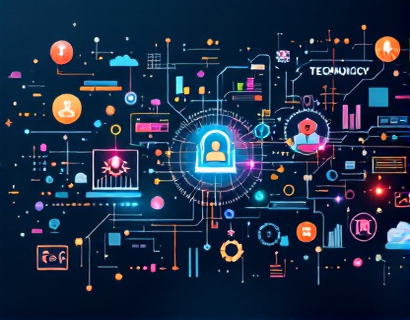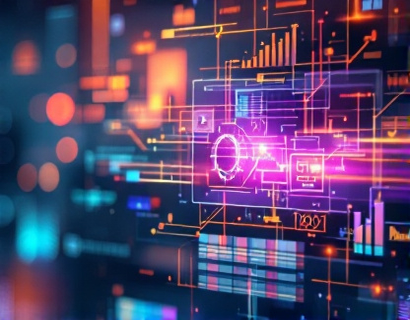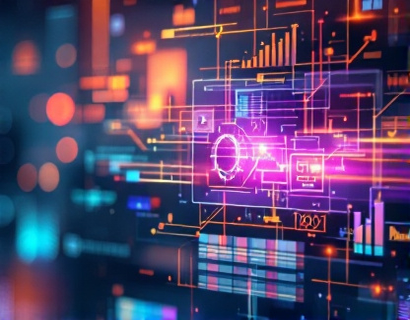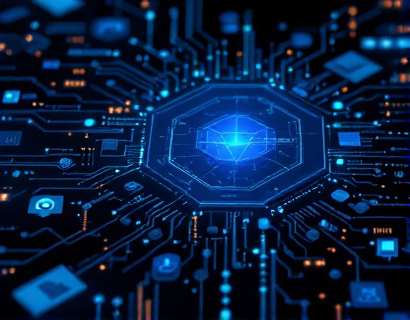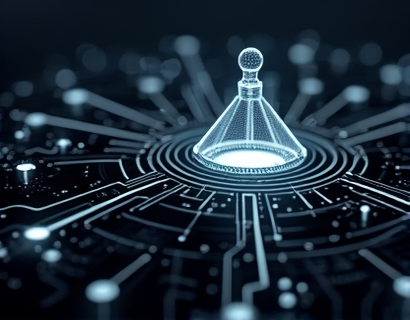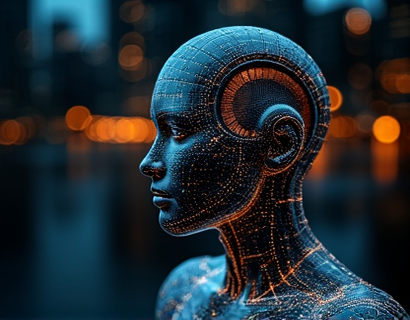Next-Gen Digital Transformation: Harnessing Crypto and AI for Innovative Solutions
The digital landscape is undergoing a profound transformation, driven by the convergence of cryptocurrency and artificial intelligence. This fusion is not just a technological curiosity but a powerful force reshaping how we interact with apps and services. As we delve into the latest advancements, it becomes clear that the integration of these technologies is unlocking unprecedented potential, offering innovative solutions that redefine user experiences.
The journey begins with understanding the individual impacts of cryptocurrency and artificial intelligence. Cryptocurrency, since its inception, has revolutionized the way we think about value, security, and decentralization. Beyond being a digital currency, it has given rise to blockchain technology, a distributed ledger that ensures transparency and immutability. This technology underpins a wide array of applications, from supply chain management to identity verification, each benefiting from its inherent security and efficiency.
Artificial intelligence, on the other hand, has been transforming industries by enabling machines to learn from data, recognize patterns, and make decisions with minimal human intervention. AI's capabilities span from natural language processing to predictive analytics, making it an indispensable tool for businesses aiming to stay competitive. The synergy between cryptocurrency and AI amplifies these benefits, creating a synergistic effect that propels digital transformation to new heights.
Blockchain's Role in Enhancing Trust and Security
One of the most significant contributions of blockchain technology is its ability to enhance trust and security in digital transactions. By providing a decentralized and transparent ledger, blockchain ensures that all transactions are verifiable and tamper-proof. This is particularly crucial in industries where trust is paramount, such as finance, healthcare, and governance.
For instance, in the financial sector, blockchain can streamline processes like cross-border payments, reducing costs and increasing speed. Smart contracts, self-executing contracts with the terms directly written into code, further automate and secure transactions. These contracts eliminate the need for intermediaries, reducing friction and enhancing efficiency. In healthcare, blockchain can secure patient data, ensuring privacy while enabling seamless data sharing among authorized parties.
AI-Driven Innovations in User Interactions
Artificial intelligence is revolutionizing user interactions by making them more intuitive and personalized. AI-powered chatbots and virtual assistants are becoming commonplace, providing instant support and guidance to users. These AI entities can understand natural language, learn from user interactions, and adapt to individual preferences, creating a more seamless and engaging experience.
Moreover, AI-driven recommendation systems are transforming how content and products are presented to users. By analyzing user behavior and preferences, these systems can suggest relevant content or products, enhancing user satisfaction and engagement. In the context of digital services, AI can optimize user interfaces, making them more user-friendly and accessible. For example, AI can dynamically adjust the layout and content based on user behavior, ensuring a tailored experience.
Decentralized Applications and User Empowerment
The combination of blockchain and AI is giving birth to decentralized applications (dApps) that empower users in unprecedented ways. Unlike traditional applications that rely on centralized servers, dApps operate on decentralized networks, giving users greater control over their data and interactions. This decentralization not only enhances privacy but also fosters a more democratic digital ecosystem.
In a dApp, users can participate in governance through token-based voting systems, ensuring that the application evolves according to the community's needs. AI can further enhance these applications by providing predictive insights and personalized experiences. For example, a decentralized social media platform can use AI to curate content based on user preferences while ensuring data ownership remains with the user.
Supply Chain Optimization Through Crypto and AI
Supply chain management is another area where the fusion of cryptocurrency and AI is making significant strides. Blockchain can provide end-to-end visibility, tracking products from manufacture to delivery. This transparency helps in identifying bottlenecks, reducing fraud, and ensuring compliance with regulations. AI can optimize various stages of the supply chain by predicting demand, managing inventory, and automating logistics.
For instance, AI algorithms can analyze historical data to forecast demand accurately, reducing overstock and understock scenarios. Blockchain ensures that all transactions and movements are recorded and verified, enhancing traceability and accountability. This combination not only improves efficiency but also builds trust among all stakeholders in the supply chain.
Enhancing Cybersecurity with Cryptographic Techniques
Cybersecurity remains a critical concern in the digital age, and the integration of cryptographic techniques offers robust solutions. Blockchain's inherent security features, such as cryptographic hashing and digital signatures, provide a strong foundation for protecting data. AI can complement these features by detecting and responding to threats in real-time.
Machine learning algorithms can analyze patterns in network traffic to identify anomalies that may indicate a security breach. By continuously learning from new data, these algorithms become more effective at predicting and mitigating threats. This proactive approach to cybersecurity is essential in an environment where attacks are becoming increasingly sophisticated.
Personalized Health Care through AI and Blockchain
In the healthcare sector, the combination of AI and blockchain is paving the way for personalized and secure medical services. Blockchain can securely store and manage patient data, ensuring privacy and compliance with regulations like GDPR. AI can analyze this data to provide personalized treatment recommendations, predict disease outbreaks, and optimize resource allocation.
For example, AI-powered diagnostic tools can analyze medical images and patient data to assist doctors in making accurate diagnoses. Blockchain ensures that patient data is securely shared among healthcare providers, enabling a coordinated and efficient care process. This synergy not only improves patient outcomes but also enhances the overall efficiency of healthcare systems.
Financial Inclusion and Cryptocurrency
Cryptocurrency plays a vital role in promoting financial inclusion, especially in underserved regions. Traditional banking systems often exclude people due to lack of infrastructure or documentation. Cryptocurrency, with its decentralized nature, can provide access to financial services without the need for intermediaries.
AI can further enhance financial inclusion by enabling more accurate credit scoring and risk assessment. By analyzing alternative data sources, AI can provide a more comprehensive view of an individual's financial behavior, making it possible to offer credit to those who might be overlooked by traditional systems. This combination can empower individuals and stimulate economic growth in underserved areas.
Challenges and Considerations
While the potential of combining cryptocurrency and AI is immense, there are challenges that need to be addressed. Regulatory uncertainty remains a significant hurdle, as governments worldwide are still grappling with how to regulate these emerging technologies. Ensuring compliance while fostering innovation is a delicate balance that requires collaboration between stakeholders.
Another consideration is the environmental impact of blockchain, particularly proof-of-work systems, which consume significant amounts of energy. Transitioning to more sustainable consensus mechanisms, such as proof-of-stake, is essential to mitigate this impact. Additionally, ensuring user education and adoption is crucial for the widespread success of these technologies.
Future Prospects and Conclusion
The future of digital transformation is bright, with the fusion of cryptocurrency and AI opening up endless possibilities. As technology continues to evolve, we can expect even more innovative applications that enhance user experiences and drive efficiency across various sectors. The key lies in embracing these advancements while addressing the associated challenges responsibly.
In conclusion, the integration of cryptocurrency and AI is not just a technological trend but a transformative force that is reshaping the digital landscape. By harnessing these powerful tools, we can create a more secure, efficient, and inclusive digital world. The journey ahead is exciting, and those who embrace these changes will be at the forefront of the next generation of digital transformation.






